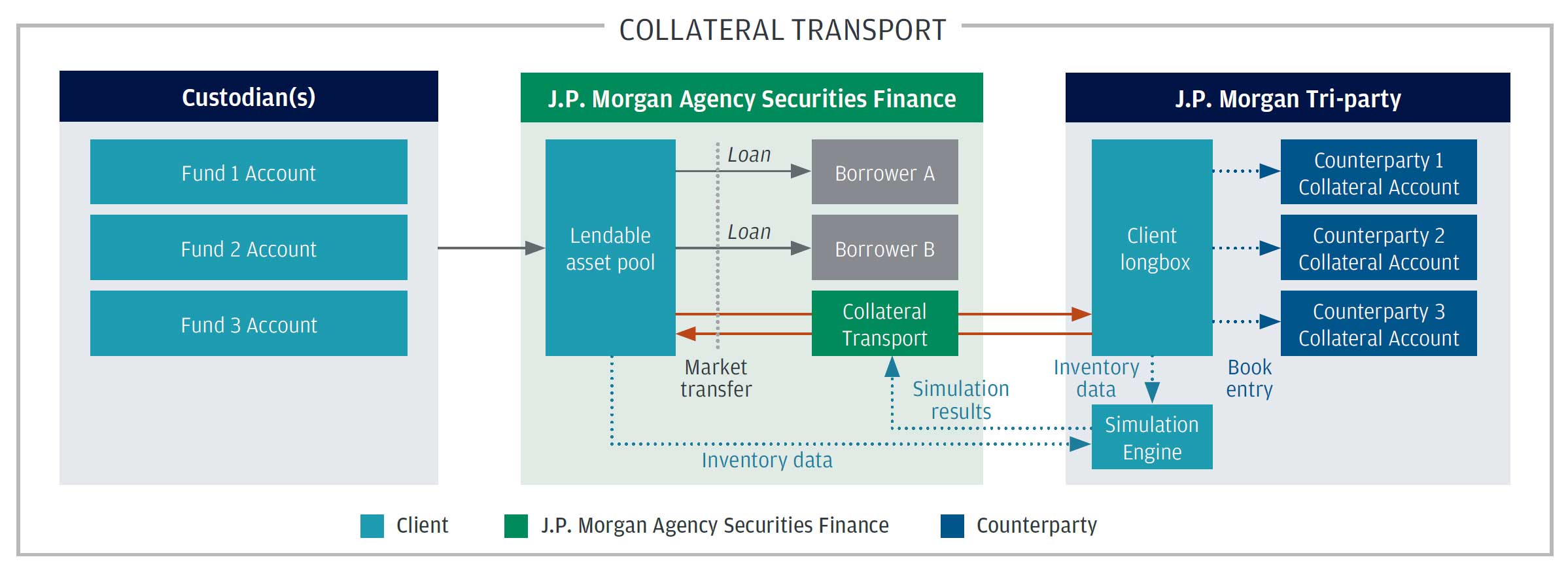Pioneering efficiency in asset inventory management
4 March 2024
J.P. Morgan’s Cathy Duan and Emily Li, APAC collateral service product managers for Securities Services, explore the firm’s new Collateral Transport 2.0 solution as the market faces UMR challenges
 Image: stock.adobe/duyina1990
Image: stock.adobe/duyina1990
In navigating the terrain of financial regulations, an increasing number of buy-side firms are confronted with the challenges of uncleared margin rules (UMR), necessitating a responsive vehicle for dynamic collateral mobilisation. J.P. Morgan’s Collateral Transport, an end-to-end asset inventory management solution, not only addresses margin obligations but also preserves trading and lending opportunities with minimum operational efforts.
By combining J.P. Morgan’s Agency Securities Finance (ASF) and Collateral Services capabilities, Collateral Transport serves as a strategic tool, facilitating the mobilisation, deployment and servicing of assets between custodians and triparty collateral agents.
Optimising asset utilisation
Collateral Transport maximises the financial benefits of unencumbered assets by mobilising the assets from their custodian to a triparty collateral agent to cover margin obligations with counterparties.
By integrating with J.P. Morgan triparty’s collateral simulation engine, Collateral Transport can minimise asset movements by generating recommendations based on the simulation results. The simulation takes into account available inventory across the client’s triparty longbox and lendable asset pool in custody. This ensures optimal asset delivery or recall before any physical transfer of assets.
Efficiency in day-to-day trading
A key strength of Collateral Transport lies in its minimal impact on daily trading and lending activities. The ASF platform facilitates asset delivery to a triparty collateral agent and the return of assets for lending or sales opportunities. Currently, securities lending traders monitor outstanding collateral transport margins, recall and substitute assets when lending demand or sale opportunities arise.
By Q3 2024, Collateral Transport will be able to assess how clients can use their assets optimally by incorporating supply and demand, bid-offer levels, and portfolio activity in the lending space. Assets in high demand will be automatically recalled and substituted from triparty collateral agents to maximise lending returns.
Collateral Transport

Preserving standard processes
Collateral Transport ensures minimal disruption to the client’s asset servicing activities as assets can be substituted and returned to its custodian ahead of the income or corporate action events.
To further reduce clients’ operational burden by Q2 2024, clients will have the option to delegate instruction generation to Collateral Transport. The platform will automatically generate free-of-payment trade instructions on clients’ behalf to move assets between triparty collateral agents and custodians — whether to top up collateral accounts, satisfy sale trades, corporate actions or lending opportunities, removing the operational burden associated with instructing Collateral Transport.
As Collateral Transport evolves with these new functionalities, it not only meets current industry challenges but helps to facilitate increasing collateral convergence across lending, financing and derivatives.
This publication is provided for information only and is not intended as a recommendation or an offer or solicitation for the purchase or sale of any security or financial instrument. The opinions, estimates, strategies and views expressed in this publication constitute our views as of the date of this publication and are subject to change without notice and J.P. Morgan does not undertake any obligation to update such information. Any opinions expressed herein may differ from the opinions expressed by other areas of J.P. Morgan, including research. J.P. Morgan assumes no responsibility or liability whatsoever to any person in respect of the contents of this publication. Any market prices, data or other information contained herein are not warranted as to completeness or accuracy and provides only a limited view of a particular market, product and/or service. This publication does not constitute advice by or on behalf of J.P. Morgan, and nothing herein should be construed as legal, regulatory, tax, accounting, investment or other advice and the recipient must make an independent assessment with its own professional advisors and no reliance should be placed on the information herein. Transactions involving securities and financial instruments mentioned herein may not be suitable for all investors.
J.P. Morgan is a marketing name for the Securities Services businesses of JPMorgan Chase Bank, N.A. and its affiliates worldwide.
JPMorgan Chase Bank, N.A., organized under the laws of U.S.A. with limited ability, is regulated by the Office of the Comptroller of the Currency in the U.S.A., as well as the regulations of the countries in which it or its affiliates undertake regulated activities. For additional regulatory disclosures regarding J.P. Morgan entities, please consult: www.jpmorgan.com/disclosures.
By combining J.P. Morgan’s Agency Securities Finance (ASF) and Collateral Services capabilities, Collateral Transport serves as a strategic tool, facilitating the mobilisation, deployment and servicing of assets between custodians and triparty collateral agents.
Optimising asset utilisation
Collateral Transport maximises the financial benefits of unencumbered assets by mobilising the assets from their custodian to a triparty collateral agent to cover margin obligations with counterparties.
By integrating with J.P. Morgan triparty’s collateral simulation engine, Collateral Transport can minimise asset movements by generating recommendations based on the simulation results. The simulation takes into account available inventory across the client’s triparty longbox and lendable asset pool in custody. This ensures optimal asset delivery or recall before any physical transfer of assets.
Efficiency in day-to-day trading
A key strength of Collateral Transport lies in its minimal impact on daily trading and lending activities. The ASF platform facilitates asset delivery to a triparty collateral agent and the return of assets for lending or sales opportunities. Currently, securities lending traders monitor outstanding collateral transport margins, recall and substitute assets when lending demand or sale opportunities arise.
By Q3 2024, Collateral Transport will be able to assess how clients can use their assets optimally by incorporating supply and demand, bid-offer levels, and portfolio activity in the lending space. Assets in high demand will be automatically recalled and substituted from triparty collateral agents to maximise lending returns.
Collateral Transport

Preserving standard processes
Collateral Transport ensures minimal disruption to the client’s asset servicing activities as assets can be substituted and returned to its custodian ahead of the income or corporate action events.
To further reduce clients’ operational burden by Q2 2024, clients will have the option to delegate instruction generation to Collateral Transport. The platform will automatically generate free-of-payment trade instructions on clients’ behalf to move assets between triparty collateral agents and custodians — whether to top up collateral accounts, satisfy sale trades, corporate actions or lending opportunities, removing the operational burden associated with instructing Collateral Transport.
As Collateral Transport evolves with these new functionalities, it not only meets current industry challenges but helps to facilitate increasing collateral convergence across lending, financing and derivatives.
This publication is provided for information only and is not intended as a recommendation or an offer or solicitation for the purchase or sale of any security or financial instrument. The opinions, estimates, strategies and views expressed in this publication constitute our views as of the date of this publication and are subject to change without notice and J.P. Morgan does not undertake any obligation to update such information. Any opinions expressed herein may differ from the opinions expressed by other areas of J.P. Morgan, including research. J.P. Morgan assumes no responsibility or liability whatsoever to any person in respect of the contents of this publication. Any market prices, data or other information contained herein are not warranted as to completeness or accuracy and provides only a limited view of a particular market, product and/or service. This publication does not constitute advice by or on behalf of J.P. Morgan, and nothing herein should be construed as legal, regulatory, tax, accounting, investment or other advice and the recipient must make an independent assessment with its own professional advisors and no reliance should be placed on the information herein. Transactions involving securities and financial instruments mentioned herein may not be suitable for all investors.
J.P. Morgan is a marketing name for the Securities Services businesses of JPMorgan Chase Bank, N.A. and its affiliates worldwide.
JPMorgan Chase Bank, N.A., organized under the laws of U.S.A. with limited ability, is regulated by the Office of the Comptroller of the Currency in the U.S.A., as well as the regulations of the countries in which it or its affiliates undertake regulated activities. For additional regulatory disclosures regarding J.P. Morgan entities, please consult: www.jpmorgan.com/disclosures.
NO FEE, NO RISK
100% ON RETURNS If you invest in only one securities finance news source this year, make sure it is your free subscription to Securities Finance Times
100% ON RETURNS If you invest in only one securities finance news source this year, make sure it is your free subscription to Securities Finance Times



